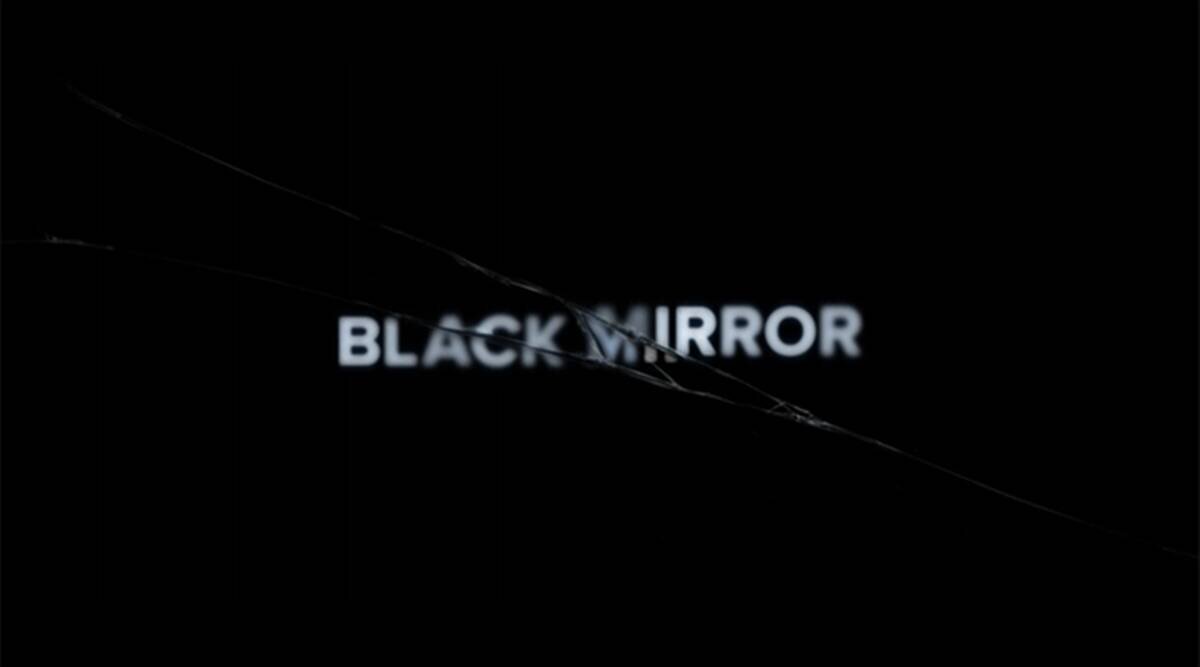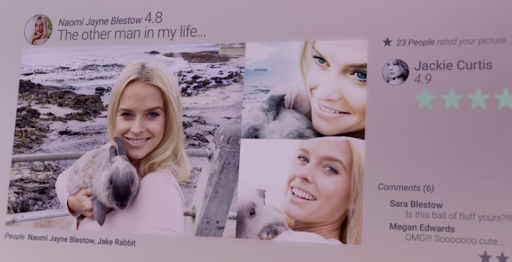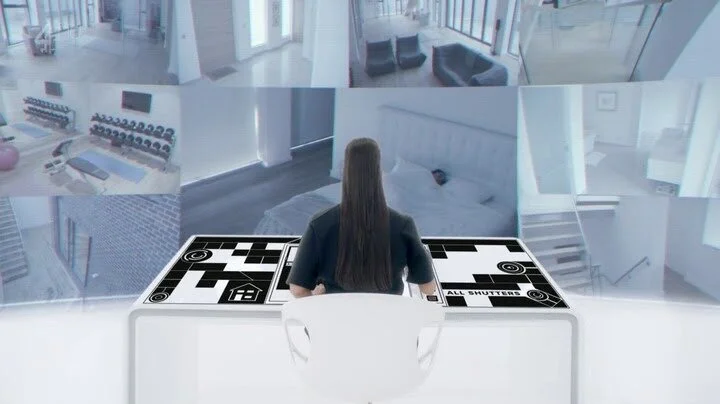Three Essential Black Mirror Episodes for New Viewers [SPOILERS]
Punishment, Privacy, Love — merely three of the many themes explored in the British anthology series, Black Mirror. Created by Charlie Brooker and inspired by The Twilight Zone, this Netflix series invites viewers to question today’s technology-driven society, pairing each thought-provoking episode with both discomfort and jaw-dropping plot twists.
According to Brooker, his unsettling experiences with social media and artificial intelligence — Siri and other smart assistants — served as catalysts in Black Mirror’s creation:
“Today it’s Siri. Tomorrow it’ll be a talking car...By the time I’m 70 I’ll be trading banter with a wisecracking smoothie carton...Like an addict, I check my Twitter timeline the moment I wake up. And I often wonder: is all this really good for me? For us? None of these things have been [forced] upon humankind — we’ve merely embraced them. But where is it all leading? If technology is a drug — and it does feel like a drug — then what, precisely, are the side effects?”
-Charlie Brooker, The Guardian
This isn’t the only project to tackle technology-centered issues.The HBO Series Euphoria and the 2013 Sci-Fi Romance Her similarly probed into social issues in a digital age, but Black Mirror is unique for several reasons. First off, it’s gorgeous. Each episode is produced similarly to a film, complete with crisp cinematography and a star-studded cast of Hollywood A-Listers and up-and-comings.
Aside from the production itself, Black Mirror shines in its stories. Science fiction usually employs outlandish elements as a front for implicitly shedding light on social issues. Black Mirror uniquely explores this genre trait in that it is very explicit with the themes and issues that are being targeted. In season five, Miley Cyrus guest stars in “Rachel, Jack and Ashley Too”, an episode that explores the darkness behind public figures’ personal lives.; “Hated in the Nation” explores cancel culture on social media and the world’s growing climate concerns; “Fifteen Million Merits” explores a slave-like existence that Brooker describes as “an incredibly reductive piss-taking version of capitalism.”
Technology is at the core of Black Mirror. The series title itself relates to technology — the cold, shiny screen of every TV, smartphone, and monitor consuming its consumers’ time is a “black mirror.” Each episode of Black Mirror invites viewers to gaze into that mirror, establishing a normality not too far off from our own and then challenging it to point out the absurdity of the episode’s society. Through this exploration into technology, many episodes are related to privacy, social media, love, artificial intelligence, and punishment. This article covers three episodes that encapsulate Black Mirror’s pathos. Next time you’re trying for the millionth time to get your friend to get sucked into the Black Mirror-verse, instead of texting or Facetiming through lighted-up black mirrors, send them this. These recommendations are in no particular order and, like all Black Mirror episodes, can be watched in any order — but be warned, there are SPOILERS!
NOSEDIVE
Season three, episode one of Black Mirror — “Nosedive” — sends viewers down the rabbit hole of toxic social media and the fallacy of needed external acceptance, and just how far we could fall down that rabbit hole through pursuing acceptance from others. The precedent of this story is a 1-5 “rating” that follows any human interaction, with an individual’s average rating carrying an impact on socioeconomic status. The audience follows Lacie (Bryce Dallas Howard), a young woman obsessed with improving her ratings. She spends all of her time practicing the perfect “happy face” in the mirror; testing out the right templates for social media posts; and anxiously gives five-stars to everyone she meets, collapsing in relief only when it’s reciprocated. Performative interactions are not always well-received, as Lacie receives several average ratings that send her down depressive spirals. On the cusp of a 4.5 rating that will allow her to live in a more affluent neighborhood, Lacie seeks out a rating consultant (yes, Penn will love this episode) to discover how to give herself a boost in ratings. Her golden opportunity finally comes when Lacie is asked to give a speech as the maid of honor to Naomi, a social media influencer who was childhood friends with Lacie.
However, the events following this offer paint a very clear picture as to why the episode is called ‘Nosedive,’ just to show that not all goes according to plan. From the moment Lacie leaves her house, she initiates a nightmarish-downward spiral that follows her actions through the rest of the episode. The stress and anxiety of the episode immediately goes through the roof, without any “scary” moments. This eventually comes together in a series of unfortunate events that lead Lacie through a veil of discovery, in which she unearths the true nature of her relationship with Naomi; the real value of a high rating; and the quickest way to land yourself in jail in “Nosedive.” (SPOILER...It’s tanking a wedding speech for your socialite childhood bestie in front of a venue full of high-fours.)
“Nosedive” wasn’t one of my favorite episodes due to its predictability, but it presents an important message that is easy to understand. Additionally, Bryce Dallas Howard’s performance carried the episode, truly immersing viewers into Lacie’s personality. While this episode is less surprising than other episodes of Black Mirror, its narrative of our obsession with image and quantification is increasingly relevant. We can all remember a time where we’ve wondered why a tweet isn’t getting more likes; gotten anxious over a credit score; or sparked up aimless conversation with an Uber driver in hopes of improving a passenger rating. That’s what makes this episode such a nightmare: these situations, and toxic social media culture, are so relatable, and toxic social media culture being projected onto reality. In fact, the episode was loosely based on an app called Peeple (marketed as “Yelp for People”) that was immediately met with backlash upon its release. This episode has stress levels relatable to Uncut Gems, with nothing going right for Lacie the moment she left her house for the wedding. The audience can’t help but cringe every time they hear the dial-down tone of Lacie receiving a negative rating. The mounting anxiety of the episode, however, is balanced out by gorgeous visuals that became a standard for Black Mirror after being given a much larger budget following Netflix purchasing the series in September 2015. Even when Lacie’s plans were falling apart, audiences watched her carry herself against stark cinematic visuals. Each episode of Black Mirror is a separate experience because of the production, with each story resembling more of a short film rather than an episode of a television series.
Black Mirror usually makes leaps and bounds with the technology displayed in their episodes, but “Nosedive” is powerful in its practicality. Since social media becomes more important each year, we must increasingly examine its mental effects and whether it is leading us to betterment. Lacie is suffering from a classic case of running on the hedonic treadmill: One positive rating can return her to a stable level of surface-level happiness, even though on the inside she is suffering from the endless pursuit of acceptance.
This episode broke the wall of normality relatively early in the episode with Lacie’s brother, and I was surprised that he didn’t play a bigger role in the episode. Lacie’s brother is present only at the beginning of the episode, but he — a mid-1 with a penchant for video games — acts as her constant reminder that her online appearance doesn’t contribute to her true happiness. Her experiences on the negative-rating nosedive proved her brother’s points right: When Lacie is finally free of technology, she is happy and laughing, not because she’s holding the door open for someone with a 4.8 rating, but because she is genuinely enjoying herself for the first time, relishing in the ability to say whatever she wanted, in whatever capacity that suited her. At this point in the episode, Lacie is truly free, reinforcing a message toward influencer-idolizers and all others alike. Lacie does not internalize her brother’s message until she separates from him, but her misfortune begins once he gives her a one-star rating before she leaves the house. Noticing such a small detail could make Lacie’s brother the true catalyst for her discovering her true happiness. If he hadn’t started the chain of events that led to her bombed rating, she most likely would have continued the path that she was on in the episode’s beginning.
“Nosedive” is among a surprisingly low amount of Black Mirror episodes that explore socioeconomic status. Each episode wows viewers with a ground-breaking advancement of tomorrow, but every single time I watch an episode I think, “Can everyone just magically afford this stuff?” Many episodes utilize very impressive technology that is used on a massive scale comparable to a device like the iPhone, yet there is never any sort of socioeconomic strain that comes from that. “Nosedive” shows the effects that Black Mirror’s toxic technology carries on individuals’ personal lives: Ratings determine one’s eligibility for opportunities like jobs, housing, and airfare booking. The system culminates in a user going to jail if fellow app users dislike them enough. However, in addition to laying all of those options out for viewers, “Nosedive” takes it a step further in showing how these stolen opportunities can all feed to each other. Lacie would get a negative rating, and the compromise that she made from her lower rating led to another negative rating, with the cycle continuing for nearly the whole episode. The most clear example of this would be the sequence from the airport to the rental car charging station, where one of Lacie’s problems directly leads to another.
This episode is a message to all of us. Performance and external opinion, especially in media, is a huge theme in Black Mirror. The external pressure from members of Black Mirror’s societies becomes of the utmost importance in episodes like “Fifteen Million Merits,” “The Waldo Moment,” and “The National Anthem.” Overall, this episode has a simple story, but that doesn’t make it any less compelling. It shows the dangers of entering a society where the landscape is nothing but superficial, and how one bad interaction with someone could send your entire, performative life into a nosedive. .
HANG THE DJ
“Hang the DJ” is the fourth episode of Black Mirror season 4. A futuristic love story, it features Frank and Amy, two newcomers to a Truman Show-styled dating world known as “The System.” In this contained world, a “Coach” dating app matches up couples and sets a time limit — from hours to years — on each relationship. .
The episode begins with the pair’s uneventful but successful first date, yet the Coach sets their relationship to last a mere 12 hours despite their obvious chemistry. Throughout the episode, Coach keeps matching Frank and Amy with various partners, even giving them a second go that Frank comedically botches. . When Coach notifies Amy of her ultimate match, she meets Frank for a 90-second farewell meeting that pushes the boundaries of their love and the System itself.
**[The rest of this review contains MASSIVE SPOILERS for the rest of “Hang the DJ”. Proceed with caution]**
After running away together, the two realize that they are caught in a simulation, as they can see hundreds of pairs of themslves in a similar, confused state. At this point, the Black Mirror twist comes in: the real Frank and Amy have never met. The Coach app has a 99.8% success rate in finding one’s ultimate match because within the app, 1000 simulations are run to see how many of them result in a rebellion against the system. In Frank and Amy’s case, 998/1000 simulations resulted in the two climbing over the wall in search of free-will and true love. The episode concludes with a shot of the real Frank and Amy meeting for dinner, both anxious to see how their first date goes.
Much like “Nosedive,” Frank and Amy’s Black Mirror tale is closely representative of a world we This episode offers a glimpse into the potential world of dystopian dating. Trust is also a big part of “Hang the DJ.” Black Mirror addresses the concept of trust in a variety of ways throughout the series. Trust in this show is usually broken through infidelity or protagonists being backstabbed as punishment. “Hang the DJ” illustrates an evocative break of trust that doesn’t ruin love through cheating or death, but through dishonesty and curiosity. Frank and Amy were living as a happy couple through their second relationship, and the two promised to not check their time limit and just enjoy the moment each day. Frank, who needed to validate his “too good to be true” romance, took the chance and looked at the time limit, accidentally ruining what would have been a five-year encounter with Amy. While Frank was dishonest and technically deserved the sanction, viewers can’t help but feel genuine disappointment when the pair’s second chance was cut short in the System’s world of superficial encounters.
One unique aspect is the characters’ awareness that something is wrong with this fabled “System.” This is hinted throughout the entire episode, from menacing bouncers guarding the System’s one restaurant, to both protagonists questioning Coach’s reliability and their own memories pre-Coach. In most episodes, the protagonist[s] implicitly defy the established normality through their own actions. This individuality is what ends up screwing the main character over in most cases, as Black Mirror often questions the practicality of free will, especially in a society controlled by autonomy. However, “Hang the DJ'' is unique because it shows us an episode where two characters are explicitly trying to defy the system. Frank and Amy know that there is something abnormal going on, and they follow that instinct. This episode directly addresses free-will in an unconventional way — way that most people wouldn’t catch two lovers defying a structured system but find out that they are meant to do just that. Rebellion against “The System” determines someone’s ultimate match for the real dating app. This twist proves Frank and Amy never had free will — their bravery was engineered by algorithms, as what they thought was bravery simply needed up being actions that they were engineered to perform.
Algorithms and, more importantly, artificial intelligence are also a common Black Mirror theme. The pair fights their way through a system in pursuit of true love, only to discover their journey was meaningless and only meant to serve the purpose of a larger algorithm. Throughout the episode, viewers think of Frank and Amy as real people with real emotions and troubles, a concept of reality that was made more clearly by basing the episode’s premise around a dating app—something that any Tinder/Bumble-user is familiar with. Yet their character development and reunion are almost made pointless when the simulation is unveiled.
Black Mirror presents stunning visuals in each entry, and “Hang the DJ” illustrates that through its simplicity. The entire episode takes place in the same intimate, minimalist settings, allowing viewers to focus on the development of the protagonists’ emotions. Despite its bittersweet ending, this is still a heartwarming episode, a Black Mirror rarity. While in the end, Frank and Amy were just pawns in the real Coach system, they still completed what they intended to do — a true happy ending for the characters. In a series where much technology is construed as negative, this Black Mirror entry offers a refreshing dose of optimism for the protagonists. Maybe the DJ, and not their romance’s success, was the only thing left hanging after all.
Ah, “White Christmas,” the Black Mirror Christmas special-- and my favorite episode. The episode starts with two roommates, Matt (John Hamm) and Joe (Rafe Spall), stationed at a remote cabin in the dead of winter. The two have lived together for five years, yet have rarely spoken up until this Christmas morning that the episode starts in. The two sit down and Matt starts telling Joe about how he ended up in the cabin as a way to break the ice between the two. This initiates the first of three intertwining stories between the episodes that touch on privacy and artificial intelligence.
The first story within the holiday episode follows Matt as he runs an online group that coaches on female seduction. Harry, who communicates with the rest of the group using “Z-Eyes,” an eye implant that records the user’s vision and hearing, crashes an office Christmas party in search of a date under Matt’s instruction. He’s doing well, until events take a turn for the worst that result in Matt disbanding the group.
Joe is still pretty silent at this point, so Matt switches gears to talk about his day job that involves “cookies”— digital clones of humans that are kept in egg-shaped capsules. Matt trains cookies, specifically to act as personal assistants to their human forms. This story follows Matt training the cookie of a woman named Greta (Oona Chaplin), who is problematic until Matt’s technology forces her into complacency.
At this point, Joe reluctantly begins to open up to Matt. He narrates the third anecdote by talking about how he was “blocked” by his fiancé Beth when the two argued over her decision to have an abortion. In this story's unique tale of technology, “blocking” someone means that they can only see a grey silhouette of the blocker and any of their offspring. After years of trying to reach Beth, Joe learns the truth behind his ex-fiancée’s child, and his story ends in a Christmas morning that is shrouded in murder and abandonment.
**[SPOILERS]**
At this point the episode starts getting super weird. Throughout Joe’s story, the cabin that the episode takes place in starts to gradually change in detail. By the end of his story, the cabin has fully transformed to resemble the scene of Joe’s crime, and the audience realizes that the two men are actually in a cookie. Specifically, they are in a world for Joe’s cookie, and the two have lived together for “five years” because Matt fast forwarded the cookie’s time by five years as part of his plan to make Joe’s cookie confess to his holiday crimes. A police officer condemns Joe’s cookie to a lifetime of torture, and the real Joe is told that his silence is useless now that his cookie has given the authorities a complete confession. Matt relishes in his victory, and the authorities agree to let him go for his collaboration with them...with a few exceptions. Matt walks out of the station for a Christmas stroll, now ostracized in a grey sea of society.
“White Christmas” was a crazy episode, which is fitting since it was originally supposed to be Black Mirror’s finale before Netflix bought the series. This was the first episode that utilizes seemingly-separate minstories, only to connect the loosely-woven thread at the end. However, this sets a unique precedent that is used in future episodes such as “Playtest” and “Black Museum.” Thematically, there’s so much to unpack in this episode, starting from the first story. Both of the main characters are very unreliable narrators, and this plays a huge part in the episode. Matt’s side-hustle as a dating coach shows the viewers how he categorizes who he sees through his clients‘ Z-Eyes, treating women as safes to crack. Matt is manipulative, preying on the best way to puppeteer those who lack confidence in themselves. The guilt of this weighs heavily on Matt after witnessing the end of Harry’s office party encounter. This first story segways into his day job as a torturer-of-sorts for artificial intelligence, with the second story quickly framing itself as a philosophical questioning of sorts, the question being: Is it ethical to torture a digital consciousness? Sure, these cookies aren’t “real,” per se, but they experience the same emotions that their human counterparts do, just within a microscopic, Alexa-esque world. We quickly start to sympathize with the cookies when we see Matt demonstrate the time mechanics, with the potential for thousands of years to pass by in mere minutes of the human world. Jon Hamm’s character quite literally drives these digital clones to insanity before forcing them to their slave-like existence, and he loves it: he relished in being able to crack Greta’s cookie just like he did after finally extracting a confession from Joe’s, all leading back to how he cracked the safes of the human world through his seduction circle. Looking on a deeper level, it begs us to wonder: What expense lies for those who provide our consumer luxuries, and what responsibilities do we owe to them? Questions like these are what Black Mirror is all about, and “White Christmas” brings the ethics surrounding AI and technology to the forefront of our minds.
The third story definitely takes a narrative approach to privacy and cyberstalking. Just like we did with Matt, the audience quickly loses any sympathy for Joe, especially when his desperation turns aggressive and violent towards Beth. The concept of “blocking” is cautionary to how we carry ourselves on the internet. When you block someone on Instagram or Twitter, there’s no chance for redemption with that user—the conversation between the two of you is gone. “White Christmas” takes the approach that blocking someone social-media-style drowns them in frustration and anger, essentially forcing them to take steps backwards since they know that any change in character will be futile while a block is still active. Joe tries to find a way around this system, and in very Black Mirror style, ends up receiving more than he asked for. When he finally is able to see who he thought was his daughter, he realizes that all the years that he has spent chasing after Beth and stalking her child were for nothing: Technology ended up giving Joe more than he ever wanted to know, and that sadly culminated in death and abandonment. All fatherly instincts left Joe after he committed the crimes at the climax of his anecdote. In short, everyone was left in a worse place. On a more general level, this specific story dealt with the problems arising from infidelity, a concept that drives many Black Mirror narratives.
This leads into the last main theme of “White Christmas:” punishment, and how to walk the fine line between justice and torture. It becomes hard for the audience to decide whose side to be on by the end of the episode, simply because by the end of the episode we discover that both characters are shitty people. A common theme of Black Mirror is that in many episodes, there is no happy ending and the main character gets screwed over in some sense, usually as a result of some form of control that someone held over them. We see this all the time in episodes like “Shut Up and Dance” or “Men Against Fire.” In this episode specifically, having two unreliable narrators that deserve little to no sympathy exacerbates this emotional issue. Joe’s cookie is tricked into confessing to his human’s crimes, and then sentenced to a lifetime of Groundhog Day style torture, which ends up also screwing over the real Joe who chose to stay silent. On the other hand, Matt chooses to help the authorities extract this confession, only to be ostracized from society for the rest of his life. Matt’s situation also speaks to the principle that sometimes the most attractive option at surface level ends up being the worse alternative. Both of these characters got screwed over by the innovation of society, and the innovation of society carried out the punishment that they have to live with for the rest of their human or digital lives. It is deserved, but is it too much? After spending an hour alongside these characters, viewers ask if this is really the best way to seek justice, similar thoughts also being evoked in torture-centric episodes like “White Bear.” Overall, “White Christmas” is as Black Mirror as Black Mirror gets, and its nightmarish tales of isolation paint a genuine picture of the world that we’re building for ourselves today. While there was snow on the ground, the events of this episode resembled anything but the purity of a “white” Christmas.
As someone who has seen all the episodes, I think these three entries paint a very accurate picture of what Black Mirror is all about. The show runner, Charlie Brooker, says that he isn’t currently working on any new episodes because the world is already bleak enough, but if you need any thought-provoking binges before the start of the new academic year, Black Mirror surely has an episode for you or your friend that is tired of hearing you talk about it.









